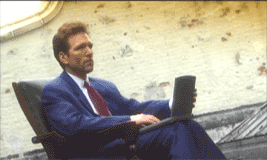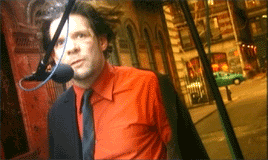|
Newest Reviews:
New Movies -
The Tunnel
V/H/S
The Tall Man
Mama Africa
Detention
Brake
Ted
Tomboy
Brownian Movement
Last Ride
[Rec]³: Genesis
Hara-Kiri: Death of a Samurai
Indie Game: The Movie
Abraham Lincoln: Vampire Hunter
Old Movies -
Touki Bouki: The Journey of the Hyena
Drums Along the Mohawk
The Chase
The Heiress
Show
People
The Strange Affair of Uncle Harry
Pitfall
Driftwood
Miracle Mile
The Great Flamarion
Dark Habits
Archives -
Recap: 2000,
2001, 2002,
2003, 2004
, 2005, 2006,
2007 , 2008
, 2009 ,
2010 , 2011 ,
2012
All reviews alphabetically
All reviews by star rating
All reviews by release year
Masterpieces
Screening Log
Links
FAQ
E-mail me
HOME
| |
The Book of Life (Hal Hartley) 1998
 Set on the eve of the millennium (December, 31, 1999), Hal
Hartley’s The Book of Life manages to send up the notion of the
apocalypse in Hartley’s typically offbeat way. The film, which is shot on
digital video, follow Jesus (Martin Donovan) as he wanders around Manhattan,
pondering whether or not he should unleash his judgment upon the world. He is
accompanied by Magdalena (P.J. Harvey) who is his personal assistant and
confidante. In a little over an hour, with only about a half dozen main
characters and only the barest special effects, Hartley weaves a fugue of hope,
resignation, and a generalized sense of millennial tension. Few writers are
better than Hartley at spinning memorable dialogue, and his stuff here is as
good as anything that he’s turned out. For example, when Jesus calls Lucifer
(Thomas Jay Ryan) on his cell phone, he greets him with a simple, “It’s
me…” Hartley always underplays things, even when the world’s about to end.
Set on the eve of the millennium (December, 31, 1999), Hal
Hartley’s The Book of Life manages to send up the notion of the
apocalypse in Hartley’s typically offbeat way. The film, which is shot on
digital video, follow Jesus (Martin Donovan) as he wanders around Manhattan,
pondering whether or not he should unleash his judgment upon the world. He is
accompanied by Magdalena (P.J. Harvey) who is his personal assistant and
confidante. In a little over an hour, with only about a half dozen main
characters and only the barest special effects, Hartley weaves a fugue of hope,
resignation, and a generalized sense of millennial tension. Few writers are
better than Hartley at spinning memorable dialogue, and his stuff here is as
good as anything that he’s turned out. For example, when Jesus calls Lucifer
(Thomas Jay Ryan) on his cell phone, he greets him with a simple, “It’s
me…” Hartley always underplays things, even when the world’s about to end.
 The film’s obviously low-budget feel barely detracts from
the overall work. Hartley takes his negatives (such as the sometimes abstract,
sometimes amateurish digital video) and spins them into positives (the first
sign of the Apocalypse is a video blip.) That he usually requires his actors to
speak in ultra-mannered tones allows us to better appreciate the nuance and
irony of the script. The satire doesn’t undermine the emotional punch of the
film, however, and the sense that there is something at stake behind Jesus’
decision is palpable. Hartley films, which tend to be wonderful experiences,
almost rely on an ability to ignore almost everything but the script and acting,
and The Book of Life is no exception. It also reveals Hartley as a strict
humanist, which tends to refute a lot of the slanderous accusations that he’s
a pretentious ironist. One can be
glad that this film, which has a somewhat one-note premise, has been kept to a
brief running time. As such, Hartley’s film (which was created for a French TV
series entitled 2000 As Seen By…alongside such films as Tsai Ming-liang’s
The Hole and Claire Denis’ Beau Travail) is a deftly executed,
wryly observed piece that admittedly pales in comparison to Hartley’s greater
works (Trust, Flirt).
The film’s obviously low-budget feel barely detracts from
the overall work. Hartley takes his negatives (such as the sometimes abstract,
sometimes amateurish digital video) and spins them into positives (the first
sign of the Apocalypse is a video blip.) That he usually requires his actors to
speak in ultra-mannered tones allows us to better appreciate the nuance and
irony of the script. The satire doesn’t undermine the emotional punch of the
film, however, and the sense that there is something at stake behind Jesus’
decision is palpable. Hartley films, which tend to be wonderful experiences,
almost rely on an ability to ignore almost everything but the script and acting,
and The Book of Life is no exception. It also reveals Hartley as a strict
humanist, which tends to refute a lot of the slanderous accusations that he’s
a pretentious ironist. One can be
glad that this film, which has a somewhat one-note premise, has been kept to a
brief running time. As such, Hartley’s film (which was created for a French TV
series entitled 2000 As Seen By…alongside such films as Tsai Ming-liang’s
The Hole and Claire Denis’ Beau Travail) is a deftly executed,
wryly observed piece that admittedly pales in comparison to Hartley’s greater
works (Trust, Flirt).
***1/2
12-31-01
Jeremy Heilman
|